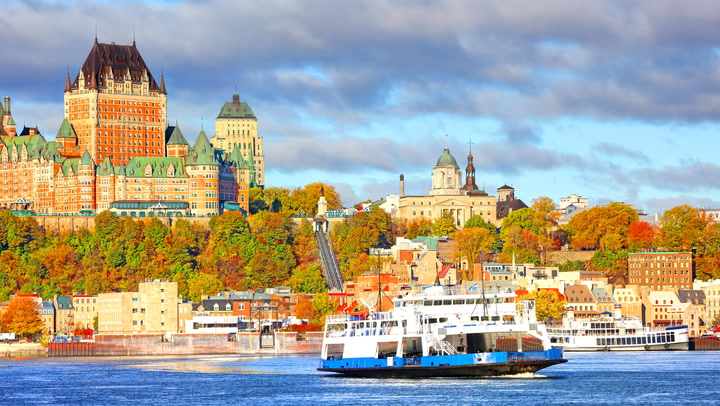1. Introduction
When to visit the Canadian destination for good weather, fall foliage, and more.
2. Overview of Quebec City
Nestled in the heart of French Canada, Quebec City is renowned for its historic architecture, lively festivals, and vibrant cultural scene. The historic district of Old Quebec looks like it is straight out of a fairytale, especially under a blanket of snow. Furthermore, with a full calendar of events—including one of the world’s largest and oldest winter carnivals—the destination attracts travelers year-round. However, certain months offer better weather and more activities than others.
3. Best Months to Experience Quebec City
“July and August are the two busiest months in Quebec City, and the weather is usually the best, with sunshine and warm temperatures,” says Christian Gingras, a local guide. Moreover, for culture seekers, visiting at the beginning of July during the city’s massive music festival, Festival d’été de Québec, is recommended. For skiers and snowboarders, January and February present beautiful conditions.
- High Seasons: June to September and January to February
- Shoulder Seasons: October, March, and May
- Low Seasons: April and November
4. Visiting Quebec City for Smaller Crowds
Quebec City is most crowded between Saint-Jean-Baptiste Day (June 24) and Labor Day, with tourism spiking again during the holiday season and the Quebec Winter Carnival, which typically runs for 10 days at the beginning of February. Consequently, visitors looking to avoid tourist droves should aim to visit in mid-September, November, April, or May.
“I really like the weeks following Labor Day, because the larger crowds have left, the weather is still very nice (even though the nights are cooler) and all sites and activities are still functioning,” says Gingras. The beginning of October is also the best time to see fall foliage in Quebec City, although cruise ship traffic tends to spike during this exciting period.
5. Best Times for Good Weather
:max_bytes(150000):strip_icc():format(webp)/TAL-quebec-city-WHENQUEBECCITY0823-5ac918d1e38a45a2b5e6bf15955b872d.jpg)
Quebec City experiences four distinct seasons, each with unique attractions. Summers are warmer, with highs around 77 degrees Fahrenheit and lows near 57 degrees Fahrenheit; however, humidity can elevate the temperature perception. In fall, temperatures range from 36 degrees Fahrenheit to 64 degrees Fahrenheit, making it ideal for hiking and enjoying the stunning leaf-peeping moments. Additionally, as Mathieu Savard, general manager of Hotel 71 notes, “Fall in Quebec City also means harvest season, which leads to incredible meals featuring local produce in most of our restaurants.”
Winter in Quebec City can be quite frigid, with January temperatures occasionally dipping below 0 degrees Fahrenheit. Nevertheless, the snowy landscape creates a mesmerizing backdrop for activities like skating, tobogganing, snowshoeing, skiing, and snowboarding. Spring can be rainy and slushy, but by May and early June, milder temperatures and longer days make for an inviting exploration environment.
6. Best Times to Visit for Lower Prices
:max_bytes(150000):strip_icc():format(webp)/TAL-quebec-city-winter-WHENQUEBECCITY0823-9c1968c95b8445b68376d8b18044f08c.jpg)
The most economical time to visit Quebec City is during the off-season months of November and April. While the weather can be unpredictable, hotel room rates are often at their lowest, and the city is less crowded, making it an appealing option for budget-conscious travelers. In November, for instance, the first snowfall can create a magical holiday ambiance with various decorations appearing throughout Old Quebec. Additionally, you may explore the Quebec City German Christmas Market or skate at the chic Place D’Youville ice rink.
April presents its own unique attractions as the month marks the peak of the sugaring season, often allowing visitors to sample fresh maple taffy and delightful confections at nearby sugar shacks.
7. Best Times to Visit for Fall Colors
:max_bytes(150000):strip_icc():format(webp)/TAL-quebec-city-fall-WHENQUEBECCITY0823-492d94e7957549a1bae0c057433f1777.jpg)
Quebec City is known for its breathtaking fall foliage, peaking from late September to early October. “In the fall, I love driving around the island of Orléans, just a 15-minute drive from the city,” says Bovoli. “You can go apple picking at one of the island’s many orchards and enjoy the stunning views of the surrounding trees and mountains.” Other popular fall destinations include the Plains of Abraham and Jacques-Cartier National Park, renowned for their natural beauty during this colorful season.
Moreover, September and October coincide with increased activity in fall foliage cruises. A boat tour on the St. Lawrence River offers a unique perspective of the stunning autumn hues.
8. Times to Avoid Quebec City
Although there isn’t a universally bad time to visit Quebec City, certain periods may be less favorable based on individual interests. Typically, the snow melts in April, leading to slushy conditions that can hinder outdoor activities. Additionally, hikers may want to steer clear of June, as the black flies can be particularly bothersome during the onset of summer.
While many consider July and August ideal in terms of weather, the crowds and humidity might be overwhelming for some visitors. On the other hand, wintertime can be harsh if one is not dressed appropriately. As locals often say, there’s no such thing as bad weather, only inadequate clothing. Therefore, with the right preparation, anyone can have a delightful experience at any time of the year.




